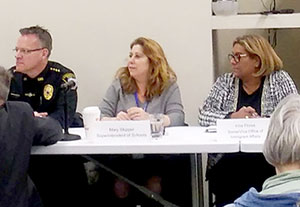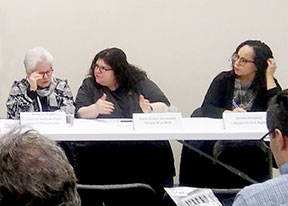
Among those joining the hate crimes panel were (L to R) David Fallon Somerville Chief of Police, Mary Skipper, Superintendent of Somerville Schools and Irma Flores, Community Engagement Specialist with the Somerville Department of Immigrant Affairs.
Urges importance of response and reporting
*
By Anna Schaeffer
Members of the Somerville community gathered last Thursday evening to discuss the rising occurrence of hate crimes in the city and state. Representatives from religious groups, city departments, legal nonprofits, the educational system, and law enforcement answered questions from the public and provided information about the city’s various methods for responding to and mitigating the impact of hate crimes.
In 2018-19, the Somerville Police department responded to two hate crimes and nine hate incidences. The distinction made by law enforcement between hate crimes and incidences is largely determined by the severity of the occurrences. Acts of prejudice that do not include violence, threats or property damage are deemed hate incidences.
In September of 2018 a clerk at Verizon Wireless was harassed by a Somerville man who shouted threats and slurs at him. In 2019, two men were attacked with bottles outside of an establishment in Somerville and told to speak English in this country.
The true number of hate crimes occurring city and statewide is likely much higher, however, due to the fact that most incidences go unreported. “We task our officers with investigating every hate crime to the fullest extent and are committed to a holistic approach that cares for victims as well,” Chief of Police David Fallon stated.

Also on the hate crimes panel were (L to R) Barbara Dougan Esq. from the Council on American-Islamic Relations, Massachusetts (CAIR-MA), Rabbi Eliana Jacobowitz of Temple B’nai Brith and Janelle Dempsey Esq. from Lawyers for Civil Rights Boston.
Mary Skipper, Superintendent of Somerville Public schools, remarked on the alarming uptick in hate incidents, crimes, and speech in schools. In 2019, there were ten hate incidents that occurred within Somerville school limits. Such incidences were primarily anti-Semitic in their nature, including vandalism, usage of epithets, and threats.
Incidents targeting racial and sexual orientation groups are also common in Somerville public schools. Skipper urged the importance of community response and reporting all hate incidents and the important role that schools have in “building a healthy and safe community for everyone.” She posits that students are largely reacting to messages they are receiving from the media, online and what they are seeing and hearing at home.
Fostering a community that is prepared to respond to hate incidents was a noted message from all of the panelists gathered at the hate crime forum. Irma Flores, community engagement specialist at Somerville’s Office of Immigrant Affairs, said that her more personal dealings with immigrant individuals in the city gave her a closer perspective on the true number of hate crimes that occur in Somerville. Flores, an immigrant from El Salvador herself, states that documentation status, fear of police, fear of retaliation and the lengthy legal process were primary deterrents to Somerville residents reporting hate crimes.
Rabbi Eliana Jacobowitz of the Temple B’nai Brith discussed the rise in anti-Semitic crimes city and statewide, noting the psychological effect that such events have on the entire community. “The reality of being Jewish in the United States has been shifting in the past year or so. We’re definitely dealing with a rise in anti-Semitic messages from crimes to propaganda on the internet and in certain media. I don’t have any answers. We’re learning how to deal with this on the go.”
For victims of hate crimes, however, there are paths in the community that can be taken to mitigate and respond to them. Janelle Dempsey Esq. with Lawyers for Civil Rights says that they provide community members with legal assistance and as well as education, voting rights and “know your rights trainings.” A special hotline at 800-994-3228 offers a more accessible route to reporting for those deterred by immediate police involvement.
Barbara Dougan with Council on American-Islamic Relations, Massachusetts suggested Active Bystander training by Quabbin Mediation as an important resource for any person looking to be more prepared to respond to hate crimes in their community.















Why are you quoting the controversial organization CAIR? Council on American-Islamic Relations has a pattern of discriminating against and mistreating their own employees, especially #women.
There are issues of religious #discrimination, sexual #harassment, #retaliation, #hostile work environment, #union busting, financial #mismanagement (including losing their 501c3 status and questions around international funding through their Washington Trust Foundation), lack of board oversight, board #incompetence, and other serious issues at CAIR. Donor funds are directly going to pay for attorneys to suppress, silence, and intimidate those who have been treated unjustly.
There are many people who have been directly harmed by #CAIR. The CAIR Sexism Documentation Project currently has 35 members, mostly women, who share their experiences of facing discrimination, and other abuses, by CAIR.
https://www.facebook.com/groups/2228298364100050/
There were several lawsuits in 2019 by former employees/board members. Employment discrimination lawsuit filed against CAIR-CA. SEE:
https://www.docdroid.net/FjATdM9/onlinedocument.pdf?fbclid=IwAR1uMMCaznSystmODEn10py3_qHMJsye9r4fkLKCYyecJ4dYzKVIWbbrVGI
Some of the local funds that chapters raise goes directly to National as part of chapter affiliation fees. And when, for 25 years, you are the national founder, national board member with no term limits, and national executive director, you have immense power on how that money is spent- including buying a brand new SUV for the executive director, paying expensive DC lawyers to shut down staff efforts to unionize, hiring attorneys to harass and intimidate women who ask for equal pay and report abuse and sexual harassment, etc. Chapters are aware of the issues but look the other way and do nothing.
This review was posted by the former executive director of a chapter: “I do not recommend donating your money to CAIR-NJ. I believe there may be a warrant out for the arrest of a former CAIR-NJ board member, who served as this organization’s treasurer, for stealing CAIR-NJ money by writing himself checks. Donors should definitely question whether their charity is legitimately being used to do civil rights advocacy, how this was allowed to happen, and whether the organization is being fully transparent. Full disclosure: I am a former Executive Director of CAIR-NJ and found the board leadership to be quite inadequate and corrupt at the expense of the community and even moreso at the expense of its staff.”
CAIR creates more victims than it helps. It does more harm than good, whether it’s the continuous negative portrayal of Muslims as victims in the media, lack of strategy, making serious mistakes on people’s cases, providing inconsistent services, the all-male press conferences, failure to build a legitimate nationwide infrastructure, lack of community engagement on the national level, not having a seat at many tables despite being around for 25 years and having an office a few blocks from the US Capitol, and so much more.
Ultimately, nothing good can come out of corruption and injustice. The community deserves a legitimate civil rights and Muslim organization that treats all people with the respect and dignity they deserve.
There was also a Disability Forum, but it wouldn’t rate an article or follow up. A large group, some elected officials and Dept. Heads met to hear concerns. It was well attended, discussion that ran way overtime because of the variety of things being presented. Does anyone out there know how the Broadway change impacts disability? No. City run programs being not accessible to disability. Park at Assembly? Not possible. The answers:. Thank you for sharing, gonna need time, money, studies…….blah, blah, blah, nothing. Not a peep from anyone. How do you choose what cause you care about?